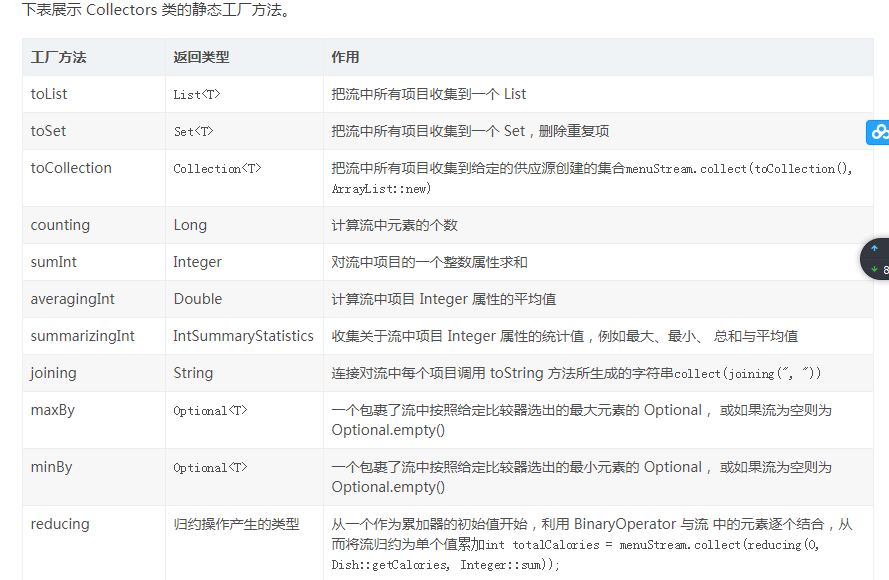本篇内容主要讲解“java中List转map的方法”,感兴趣的朋友不妨来看看。本文介绍的方法操作简单快捷,实用性强。下面就让小编来带大家学习“java中List转map的方法”吧!
方法1:
@Override
public String toString() {
return "User{" +
"id=" + id +
", age='" + age + '\'' +
'}';
}
Map<Long, User> maps = new HashMap<>();
for (User user : userList) { maps.put(user.getId(), user); }
方法2:使用 guava
Map<Long, User> maps = Maps.uniqueIndex(userList, new Function<User, Long>() {
@Override
public Long apply(User user) {
return user.getId();
}
});
可以进一步简化
ImmutableMap<String, WebUser> map = Maps.uniqueIndex(users,WebUser::getNickname);
方法3: 使用jdk1.8
Map<Long, User> maps = userList.stream().collect(Collectors.toMap(User::getId,Function.identity()));
Map<Long,User> maps = userList.stream().collect(Collectors.toMap(User::getId,Function.identity()));
看来还是使用JDK 1.8方便一些。另外,转换成map的时候,可能出现key一样的情况,如果不指定一个覆盖规则,上面的代码是会报错的。转成map的时候,最好使用下面的方式:
Map<Long, User> maps = userList.stream().collect(Collectors.toMap(User::getId, Function.identity(), (key1, key2) -> key2));
Map<Long,User> maps = userList.stream().collect(Collectors.toMap(User::getId,Function.identity(),(key1,key)->key2))
有时候,希望得到的map的值不是对象,而是对象的某个属性,那么可以用下面的方式:
Map<Long, String> maps = userList.stream().collect(Collectors.toMap(User::getId, User::getAge, (key1, key2) -> key2));
Map<Long,String>maps = userList.stream().collect(Collectors.toMap(User:getId,User::getAge,(key1,key2)->key2));
1、分组
List里面的对象元素,以某个属性来分组,例如,以id分组,将id相同的放在一起:
//List 以ID分组 Map<Integer,List<Apple>>
Map<Integer, List<Apple>> groupBy = appleList.stream().collect(Collectors.groupingBy(Apple::getId));
Map<Integer,List<Apple>> groupBy = appleList.stream().collect(Collectors.groupingBy(Apple::getId));
System.err.println("groupBy:"+groupBy);
{1=[Apple{id=1, name='苹果1', money=3.25, num=10}, Apple{id=1, name='苹果2', money=1.35, num=20}], 2=[Apple{id=2, name='香蕉', money=2.89, num=30}], 3=[Apple{id=3, name='荔枝', money=9.99, num=40}]}
/**
* List -> Map
* 需要注意的是:
* toMap 如果集合对象有重复的key,会报错Duplicate key ....
* apple1,apple12的id都为1。
* 可以用 (k1,k2)->k1 来设置,如果有重复的key,则保留key1,舍弃key2
*/
Map<Integer, Apple> appleMap = appleList.stream().collect(Collectors.toMap(Apple::getId, a -> a,(k1,k2)->k1));
打印结果:{1=Apple{id=1, name='苹果1', money=3.25, num=10}, 2=Apple{id=2, name='香蕉', money=2.89, num=30}, 3=Apple{id=3, name='荔枝', money=9.99, num=40}}
3、过滤Filter
从集合中过滤出来符合条件的元素:
//过滤出符合条件的数据
List<Apple> filterList = appleList.stream().filter(a -> a.getName().equals("香蕉")).collect(Collectors.toList());
System.err.println("filterList:"+filterList);
[Apple{id=2, name='香蕉', money=2.89, num=30}]
4.求和
将集合中的数据按照某个属性求和:
//计算 总金额
BigDecimal totalMoney = appleList.stream().map(Apple::getMoney).reduce(BigDecimal.ZERO, BigDecimal::add);
System.err.println("totalMoney:"+totalMoney); //totalMoney:17.48
5.查找流中最大 最小值
Collectors.maxBy 和 Collectors.minBy 来计算流中的最大或最小值。
Optional<Dish> maxDish = Dish.menu.stream().
collect(Collectors.maxBy(Comparator.comparing(Dish::getCalories)));
maxDish.ifPresent(System.out::println);
Optional<Dish> minDish = Dish.menu.stream().
collect(Collectors.minBy(Comparator.comparing(Dish::getCalories)));
minDish.ifPresent(System.out::println);
去重
import static java.util.Comparator.comparingLong;
import static java.util.stream.Collectors.collectingAndThen;
import static java.util.stream.Collectors.toCollection;
// 根据id去重
List<Person> unique = appleList.stream().collect(
collectingAndThen(
toCollection(() -> new TreeSet<>(comparingLong(Apple::getId))), ArrayList::new)
);


到此,相信大家对“java中List转map的方法”有了更深的了解,不妨来实际操作一番吧!这里是亿速云网站,更多相关内容可以进入相关频道进行查询,关注我们,继续学习!
亿速云「云服务器」,即开即用、新一代英特尔至强铂金CPU、三副本存储NVMe SSD云盘,价格低至29元/月。点击查看>>
免责声明:本站发布的内容(图片、视频和文字)以原创、转载和分享为主,文章观点不代表本网站立场,如果涉及侵权请联系站长邮箱:is@yisu.com进行举报,并提供相关证据,一经查实,将立刻删除涉嫌侵权内容。
原文链接:https://my.oschina.net/u/2425942/blog/3077647